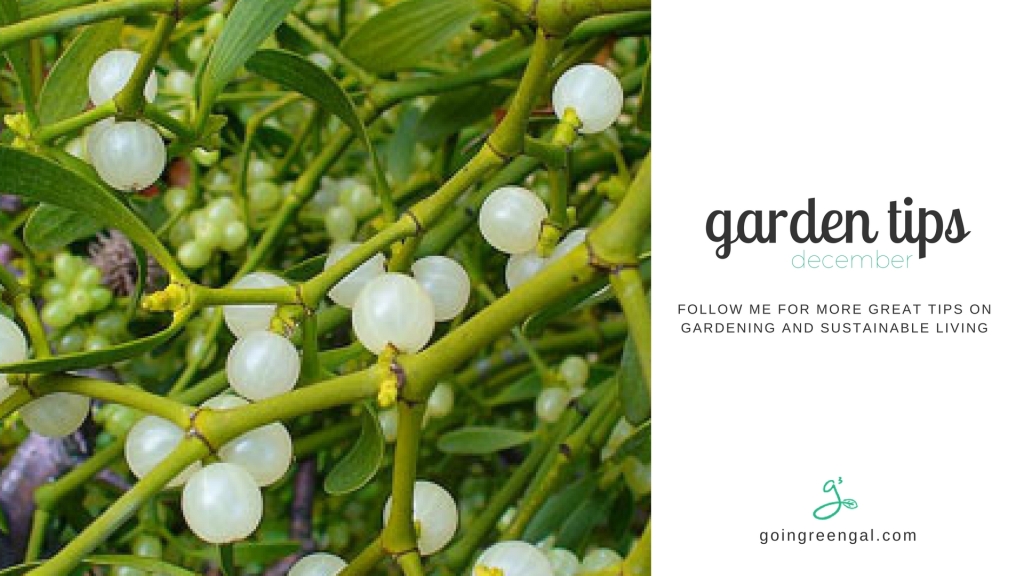Beware of poisonous plants, such as Poinsettia and Mistletoe, they can be harmful to both humans and pets. Don’t be afraid to enjoy them for the holidays, just keep them out of reach from children and those curious dogs and cats.
Protect plants from frost by placing stakes around tender plants and covering with clear plastic or fabric such as a sheet or old blanket. Don’t let the plastic touch the foliage. Wrap larger plants with strings of small Christmas tree lights and cover with a sheet. Turn the lights on at night. If plants are potted, move them to a sheltered area such as a porch, under the eves on the south side of the house or even under a tree. Be sure to uncover them during the day. Moving them indoors to a cool room would also be good, if possible. Don’t prune frost damage on a plant until new growth starts in spring. The dead material helps protect the plant from further damage.
Clean garden beds in preparation for winter. Many insects and diseases over-winter in fallen debris. Prune diseased leaves from roses, camellias, rhododendrons and azaleas. Leave leaf litter under oaks, pine and junipers; the leaf duff helps protect the roots.
Winter watering is important if there has been no rain for a week or two. Use a moisture meter or a shovel to dig into the soil (at least 6 inches below the surface) to see if the soil has dried out. This is especially important for recently installed plantings.
Prune apple trees that have weak or unproductive branches. Apple trees produce fruit terminally on spurs located on wood 2-8 years old. Pruning allows sunlight into the tree to encourage good spur development.
Prune blackberries as soon as harvest is complete. Remove all wood that has produced the current year’s crop, and trellis remaining large branches immediately; a fan shape is recommended. Tipping (removing the end of the canes) will promote larger berries and help keep the plant more manageable.
Harvest kiwis when they are still hard, then let them soften at room temperature. Watch the vines for signs of ripeness; a few fruit will turn soft and the skin color will change from greenish to full brown. Fruit can be left on the vine after the leaves fall off. Kiwis can be stored in the refrigerator for up to 4 months or at room temperature for about 2 weeks.
Peppertree pysllid are greenish or tan pear shaped pests that cause damage to California peppertrees. Tiny, translucent, white eggs turn into orangish nymphs that feed on new plant growth. Leaves will appear wrinkled or twisted. The pest rarely does serious damage to the tree, so control methods aren’t usually necessary.
Mistletoe is a parasitic plant that reduces the vigor and health of its host tree. Cut off any affected limb 18” or more below the mistletoe attachment. If this isn’t possible, remove the mistletoe and wrap the infected area with black plastic to prevent re-sprouting.
For our complete list of December Gardening Tips, click on: http://www.mastergardeners.org/tips/december.html










 Being an avid gardener, born and raised in Indiana, I feel incredible blessed to live in sunny California & be able to grow my own food all year-round! I write a monthly garden column for the San Jose Mercury News & am constantly striving for tips & ideas on how to live a little more gently in regards to ourselves, our planet & each other – basically sustainability we can live with! As a
Being an avid gardener, born and raised in Indiana, I feel incredible blessed to live in sunny California & be able to grow my own food all year-round! I write a monthly garden column for the San Jose Mercury News & am constantly striving for tips & ideas on how to live a little more gently in regards to ourselves, our planet & each other – basically sustainability we can live with! As a 



